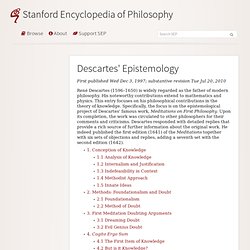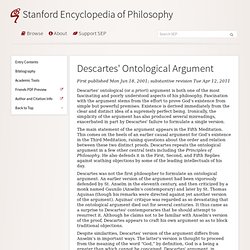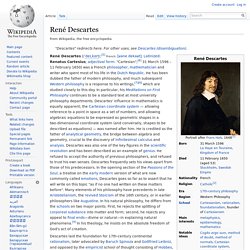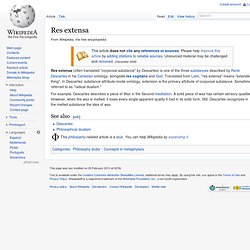

Descartes' Epistemology. First published Wed Dec 3, 1997; substantive revision Tue Jul 20, 2010 René Descartes (1596–1650) is widely regarded as the father of modern philosophy.

His noteworthy contributions extend to mathematics and physics. This entry focuses on his philosophical contributions in the theory of knowledge. Specifically, the focus is on the epistemological project of Descartes' famous work, Meditations on First Philosophy. Upon its completion, the work was circulated to other philosophers for their comments and criticisms. 1. 1.1 Analysis of Knowledge Famously, Descartes defines knowledge in terms of doubt. I distinguish the two as follows: there is conviction when there remains some reason which might lead us to doubt, but knowledge is conviction based on a reason so strong that it can never be shaken by any stronger reason. (1640 letter, AT 3:64–65) Elsewhere, while answering a challenge as to whether he succeeds in founding such knowledge, Descartes writes: Many will balk at the suggestion. 2. Descartes' Meditations Home Page.
Descartes Ontological Argument (Stanford Encyclopedia of Philosophy) - StumbleUpon. First published Mon Jun 18, 2001; substantive revision Tue Apr 12, 2011 Descartes' ontological (or a priori) argument is both one of the most fascinating and poorly understood aspects of his philosophy.

Fascination with the argument stems from the effort to prove God's existence from simple but powerful premises. Existence is derived immediately from the clear and distinct idea of a supremely perfect being. Ironically, the simplicity of the argument has also produced several misreadings, exacerbated in part by Descartes' failure to formulate a single version. The main statement of the argument appears in the Fifth Meditation. Descartes was not the first philosopher to formulate an ontological argument. Despite similarities, Descartes' version of the argument differs from Anselm's in important ways. 1. One of the hallmarks of Descartes' version of the ontological argument is its simplicity.
Version B: I have an idea of supremely perfect being, i.e. a being having all perfections. 2. René Descartes. Descartes laid the foundation for 17th-century continental rationalism, later advocated by Baruch Spinoza and Gottfried Leibniz, and opposed by the empiricist school of thought consisting of Hobbes, Locke, Berkeley, and Hume.

Leibniz, Spinoza and Descartes were all well versed in mathematics as well as philosophy, and Descartes and Leibniz contributed greatly to science as well. His best known philosophical statement is "Cogito ergo sum" (French: Je pense, donc je suis; I think, therefore I am), found in part IV of Discourse on the Method (1637 – written in French but with inclusion of "Cogito ergo sum") and §7 of part I of Principles of Philosophy (1644 – written in Latin). Early life[edit] Descartes was born in La Haye en Touraine (now Descartes), Indre-et-Loire, France. When he was one year old, his mother Jeanne Brochard died. In his book, Discourse On The Method, he says "I entirely abandoned the study of letters. Visions[edit] Work[edit] Descartes lived on Westermarkt 6 (on the left) Res extensa. Res extensa (often translated "corporeal substance" by Descartes) is one of the three substances described by René Descartes in his Cartesian ontology, alongside res cogitans and God.

Translated from Latin, "res extensa" means "extended thing". In Descartes' substance-attribute-mode ontology, extension is the primary attribute of corporeal substance. Sometimes referred to as "radical dualism. " For example, Descartes describes a piece of Wax in the Second meditation.
A solid piece of wax has certain sensory qualities.